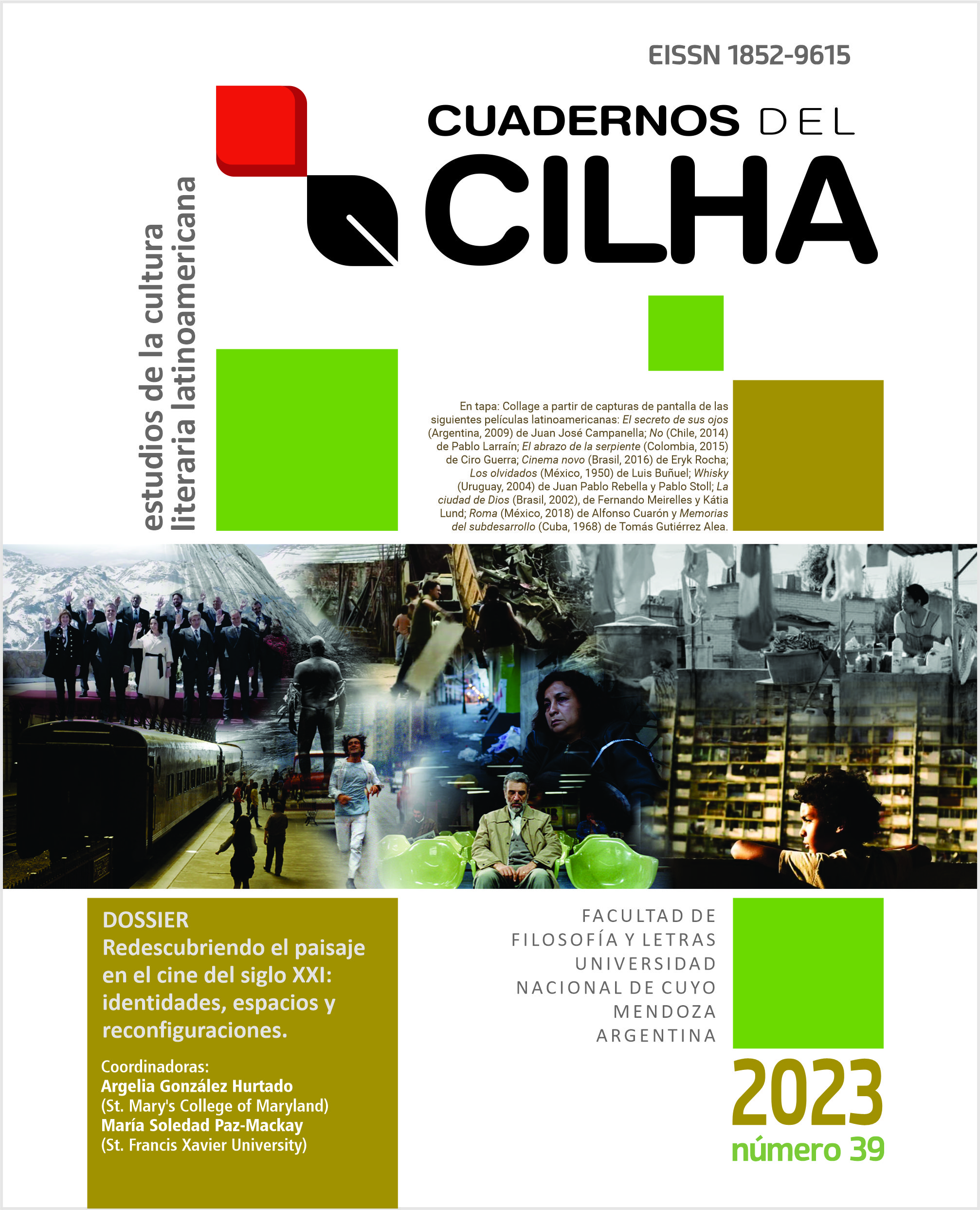Capitalism's Waste: Debt-Bondage, Landscape, and Extractivism in 7 Prisoneiros
DOI:
https://doi.org/10.48162/rev.34.062Keywords:
landscape, debt-bondage, extractivism, capitalismAbstract
The expression, selva de pedra, is one of the most common epithets used to describe the megalopolis that is São Paulo, Brazil. This selva de pedra is characterized by a landscape of high-rises that indicate the triumph of modernity, but at the same time hides capitalism’s waste as well as cruellest mechanisms. For example, debt-bondage is a capitalistic system of mechanisms which subjugate and exploit individuals in a manifestation of modern-day slavery. That being said, debt-bondage is a rare topic in today’s Brazilian cultural production but has come to Surface recently in the social sphere due the film, 7 prisoneiros (2021) that deals with the exploitation of individuals in the urban landscape of São Paulo. In this manner, the landscape reflects the metamorphosis that occurs in the characters who are exploited in the film. In this article, I use the theoretical framework of Teresa P.R. Caldeira and her notion of fortified enclaves, as well as Zygmunt Bauman’s sociological discourse to analyse how the urban landscape (de)constructs the subjectivity of the characters in Sete prisoneiros. Therefore, one can delineate how debt-bondage is a by-product of the extractivism and how this system exploits the individual and how this system is one that hides in the shadows of the immense selva de pedra that is São Paulo.
References
3 Abolition. (s.f.) Brown University. https://library.brown.edu/create/fivecenturiesofchange/chapters/chapter-4/abolition/
Bauman, Z. (2011). Wasted Lives: Modernity and Its Outcasts. Reprint. Polity.
Bauman, Z. and Hermida Lazcano, P. (2007). Vidas desperdiciadas: la modernidad y sus parias. Paidós.
Caldeira, T. P. d. R. (2000). City of Walls: Crime, Segregation, and Citizenship in São Paulo. University of California Press.
Cunha, M. and da Silva, A. M. (Eds.) (2018). Human Rights, Social Movements and Activism in Contemporary Latin American Cinema. Springer Berlin Heidelberg.
Felperin, L. (Web 20, 2021). 7 Prisoners Review - Devastating but Compelling Trafficking Drama. The Guardian.
Herrera, I. (nov. 11, 2021). ‘7 Prisoners’ Review: Survival at Any Cost. The New York Times. https://www.nytimes.com/2021/11/11/movies/7-prisoners-review.html
ILO Says Forced Labour Generates Annual Profits of US $150 Billion (may. 20, 2014). Ilo News. http://www.ilo.org/global/about-the-ilo/newsroom/news/WCMS_243201/lang--en/index.htm
Luca, T. d. (2013). The Geography of Segregation: Violence and Class Division in Contemporary São Paulo Cinema. In L. Bayman and N. Pinazza (Eds), World Film Locations: São Paulo (pp. 82-83). World Film Locations Series. Intellect.
Luna, F. V., and Klein, H. S. (2018). An Economic and Demographic History of São Paulo, 1850-1950. Social Science History Series. Stanford University Press.
Moratto, A. (2021). 7 Prisioneiros. Crime, Drama. Noruz Films (I), O2 Filmes.
Pereira, A. B. (2010). As marcas da cidade: a dinâmica da pixação em São Paulo. Lua Nova: Revista de Cultura e Política, pp. 143–62. https://doi.org/10.1590/S0102-64452010000100007
Rudnick, H. H. (1995). The Locus Amoenus: On the Literary Evolution of the Relationship between the Human Being and Nature. In A.-T. Tymieniecka (ed.), The Elemental Passion for Place in the Ontopoiesis of Life: Passions of the Soul in the Imaginatio Creatrix (pp. 23–34). Springer Netherlands.
Wilderom, M. (2022). Paisajes urbanos recuperados. Reacciones arquitectónicas que replantean la infraestructura. Dearq, 33, (May), pp. 54-65. https://doi.org/10.18389/dearq33.2022.06
Zilberman, A. (november, 2, 2021). This Socially Conscious Human-Trafficking Film Implicates a Broken Society The Washington Post. https://www.washingtonpost.com/goingoutguide/movies/7-prisoners-movie-review/2021/11/01/65084b36-38c7-11ec-9bc4-86107e7b0ab1_story.html












































